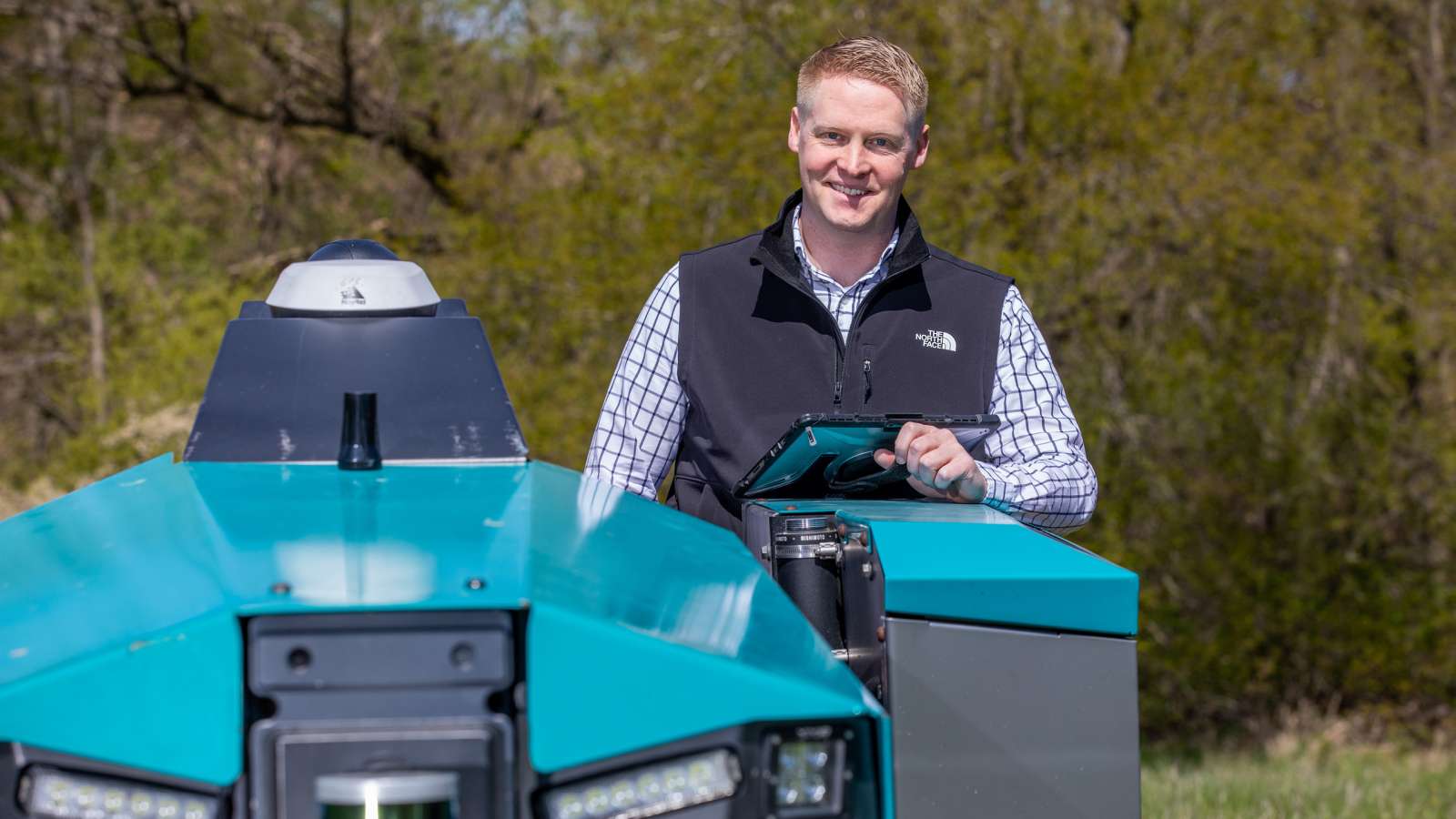Visibility from the cockpit is limited. Next to nothing. Colin Hurd can only see the readings on the instrument panel in front of him as he flies the Cirrus SR22.
This would be anxiety-inducing for many, but for Hurd (’13 agricultural studies), it’s all part of the plan. He’s working on his instrument pilot rating, and learning to fly in poor weather conditions has been the focus of nearly a year of lessons.
His vision is obscured by a pair of “foggles” that simulate the experience of flying through rough weather by clouding his vision just as actual clouds would do. Outside the cockpit, a clear, blue Iowa sky surrounds him.
Hurd has no trouble trusting the instrumentation and automation of the airplane’s systems. He’s CEO of Mach Inc. – a company that creates autonomous solutions for heavy equipment. Hurd flies himself to client and development meetings, and he’s learned he can rely on technology.
Hurd and the rest of the Mach team, including Chief Technology Officer Rhett Schildroth (’94 mechanical engineering), work directly with leading original equipment manufacturers like Vermeer and Kuhn. Mach provides technical solutions in perception, navigation, route planning, monitoring, and connectivity to sync up their companies’ existing autonomous tech with tasks that clients demand.
“Any time someone invests in an autonomous tractor they’re looking to do a specific job with it – tillage, baling hay, pulling a grain cart, seeding,” Hurd says. “Mach provides the implement and tractor manufacturers with the tech needed to automate what’s going on behind the hitch for a seamless operation.”
Gaining Efficiencies, Safety
Hurd makes an important distinction between automation and autonomy.
“In terms of automation in agriculture and farming, we’re very advanced. I would say 90-plus percent of modern farms are using some type of automation like rate control, auto guidance, or GPS steering. In terms of autonomy [operator-optional farming] we’re at the infancy,” he says.
Autonomous technology will allow farmers to spend less time in the cab and more time exploring what’s working, making management and agro-nomic decisions, and improving overall efficiencies on the farm. And, it could ultimately improve workplace safety.
“A big part of what excites me about integrating this technology is that the farmer doesn’t need to be physically present to operate. As we put machine vision in place, a lot of machines will have the ability to detect when a person is within its hazard zone and shut off or establish a safer route around an obstacle,” Hurd says.
Asking The Right Questions
Hurd is a serial entrepreneur, dating back to the launch of his first company, which resulted from a class assignment in the Entrepreneurship in Agriculture course at Iowa State. His charge was to develop an original business concept that solved a problem.
“As farmer’s size up their equipment to reduce time in the field, larger equipment leads to more soil compaction which can detrimentally affect yield and profitability,” Hurd says.
He and Kyle Meyer (’05 agricultural systems technology) created TrackTill, a tillage implement used behind planter tires to break up soil compaction. They established the corporation Agricul-tural Concepts to develop and market the idea with support from Iowa State’s Agricultural Entrepreneurship Initiative and field testing by ISU Extension and Outreach. The product was released in January 2014 and gained quick atten-tion. They licensed it to Yetter in 2015.
Hurd kept wondering if he was asking the right questions. Was it about undoing soil compaction, or were there new ways to prevent it from happening in the first place? Farmers were using larger and larger equipment to reduce labor. Was there another way to reduce labor that would also allow farmers to use lighter, smaller equipment?
Finding a solution would impact two major agricultural issues: addressing labor shortages and promoting soil health. In 2016 Hurd founded his second company, Smart Ag, with fellow Iowa Staters Quincy Milloy, and farmer Mark Barglof (’02 mechanical engineering) to do just that.
Smart Solutions
Smart Ag developed the first retrofit driverless system to automate tractors. The “plug-and-play” tech catapulted Hurd, a Story City, Iowa, native into the national spotlight earning him a place among Forbes magazine’s 2018 list of 30 Under 30 Entrepreneurs in Manufacturing and Industry across the U.S. and Canada.
After funding and growing the company, he led Smart Ag through an exit to Raven Industries in 2019. Raven was acquired by CNH Industrial – owner of core brands Case IH and New Holland – in 2021. Hurd managed business development for Raven until joining MACH in 2022.
“I first met Colin when he was fresh out of college and just starting his entrepreneurial journey. His ability to understand what was important in a business and focus on those things was extremely impressive,” Schildroth says.
“That’s one of the reasons why when he asked me to come aboard and merge my company with another to form Mach, I was very enthusiastic to do so.”
Hurd’s curiosity drives him to consider an evolving list of questions to benefit farmers’ bottom lines and help position American agriculture as a global leader.
And through his support of entrepreneurship programs in the College of Agriculture and Life Sciences, Hurd is fostering the curiosity of the next generation of Iowa Staters.
“I don’t think there is a better place in the world to be an agricultural focused entrepreneur than within the ISU ecosystem,” Hurd says. “It benefited me a lot over the years, so I am always looking for ways to engage with start-ups and investors to reinvest back into the space.”
